When we love someone deeply we remember all we can about their lives including the manner of their dying and parting from us. We remember most of all how they loved us in big and little ways and what they taught us. As we mature we attribute meaning to many of the things they did and said and this gives meaning to our own lives. I was raised by my mother and my Grandmother and we lived together in a small frame house in Brooklyn, New York with my two Uncles. We were also surrounded by a host of other family members from near and far in my youngest years. My Grandmother was the head of this clan and a leader in her church and in the community. Her vibrant faith, accepting love and joy drew people to her. She was my best friend and my anchor and I loved her very much. She always said that she wanted to live until I was married. She was 65 when I was born and almost 85 when she died. I was married for four months when she died.
I was not ready for her death but if it had been gentle it would have been easier. She died of a cancer that had metastasized and her suffering unhinged all who loved her. Her faith held strong but pain management in those days was totally inadequate. My faith in God was strong like hers, but I did not know how God could let one of God’s most faithful suffer and die like this. After almost two months of awful suffering in Kings County Hospital, hooked up to IV’s and not visibly responsive to my evening visit, she finally got to go home to God in the early morning hours. I wondered what took God so long. I was numb and could not cry until my friend Barbara’s Grandmother, Hattie Ballard, a beautiful African- American woman of faith, took me in her arms and said “She’s at home with God, I’ll be your Grandma now”.
Even as I write this so many years later tears well up. And that is the same way I feel about Jesus and remembering his execution. It is my love for him that makes me remember the giving of himself throughout his life and in the Last Supper, his terrible suffering on the cross and the unbelievable miracle of his resurrection. In Aramaic the word “believe” carries connotations of love not abstract belief. In love I remember it all.
I do not seek to wipe out the hard parts and have a Pollyanna faith built on a flimsy superficial notion of love. Real love remembers all of it and does not simply delete the suffering at the end. But his death should not loom so large that we forget all he did and taught-all he was in all of his humanity and all of his Godness.
It is not that his death overshadows his life and his resurrection for me. I remember everything I can about my Grandmother and I remember all that Jesus did and taught and what I can comprehend about what and who he was-the Christ he is. It is that, as hard as it is, I did learn from my Grandmother’s hard death. I learned about suffering. I learned it early and I have learned much more of it in my life than may be “a fair share”. But I also learned there is no fair share-only that God is with us through the suffering and sometimes a Grandma Ballard will step forward and will help ease the pain. And I learned that life comes after death, for the deceased and also for those who mourn and live on. Let us not be afraid of remembering and embracing the cross.
This is what Pope Francis said about the centrality of the cross in our faith. “When we journey without the cross,when we build without the cross,when we profess Christ without the cross,we are not disciples of the Lord,we are worldly….My wish is that all of us will have the courage to walk in the presence of the Lord,with the Lord’s cross….” Pope Francis
On September 14, 2014 we will celebrate the feast day of the Holy Cross. The following is from the writings of Frederick Beuchner in FrederickBeuchnersBlog.com.
“Here is this week’s reading from the gospel of John: John 3:13-17
“…. just as Moses lifted up the serpent in the wilderness, so must the Son of Man be lifted up, that whoever believes in him may have eternal life. For God so loved the world that he gave his only Son, so that everyone who believes in him may not perish but may have eternal life. For God did not send his Son into the world to condemn the world, but that the world might be saved through him.”
“The following excerpt was originally published in The Faces of Jesus and later in Listening to Your Life.
“God so loved the world,” John writes, “that he gave his only son, that whoever believes in him should not perish but have eternal life.” That is to say that God so loved the world that he gave his only son even to this obscene horror; so loved the world that in some ultimately indescribable way and at some ultimately immeasurable cost he gave the world himself. Out of this terrible death, John says, came eternal life not just in the sense of resurrection to life after death but in the sense of life so precious even this side of death that to live it is to stand with one foot already in eternity. To participate in the sacrificial life and death of Jesus Christ is to live already in his kingdom. This is the essence of the Christian message, the heart of the Good News, and it is why the cross has become the chief Christian symbol. A cross of all things – a guillotine, a gallows – but the cross at the same time as the crossroads of eternity and time, as the place where such a mighty heart was broken that the healing power of God himself could flow through it into a sick and broken world. It was for this reason that of all the possible words they could have used to describe the day of his death, the word they settled on was “good.”Good Friday.”
No, I don’t understand all of what happened on the Cross or how time and eternity met, but I understand that Jesus asked his Abba God to “forgive them, for they know not what they do”. In relationship with Jesus, the Christ, I know his love and I know the life that it gives, now, and forever. I know it within and for myself and I see it every day in the lives of those around me who have suffered the ravages of poverty and illness. I know that the Cross and Resurrection are two parts of one action and that they form the centerpiece of Christianity. A centerpiece centers us,draws us in, but all else that Jesus did and taught about love and justice, peace and inclusion and forgiveness completes the picture. In a way it is our love for Christ and following Christ, our functions as part of the body of Christ,that is completing the picture of God’s kingdom or kin-dom on earth that includes everyone. And it is all about the power of Love/love.
There are some who make the Cross the whole picture. As in the Mel Gibson film The Passion they center only on the suffering. They ignore all that Jesus was, taught, did and wants us to do. They even minimize the Resurrection! At the end of the film the Resurrection was pictured in one frame, in a small box on the screen. They got the proportions all wrong. The Resurrection is even bigger than the death as new and forever life flows from it-from the life of Christ to the Cross and through the Resurrection. The early church would have never lived and spread far and wide if something huge like the Resurrection had not happened.
As feminist social ethicist Beverly W. Harrison said crucifixions are going to happen. From Jesus, to many of the saints, to M.L.King, Jr, to Oscar Romero and beyond. “Radical love is a dangerous and serious business….There is no way around crucifixions given the power of evil in the world. But….the aim of love is not to perpetuate crucifixions but to bring an end to them.’’ Indeed, she continues, “we are not called to practice the virtue of sacrifice but to lovingly pass on the power of radical love.” Harrison is right, “there is no way around crucifixions given the evil in the world” and there is no way around the existence and pain of sin, social sin, mass killings, rape and genocide, corporate and individual greed and other individual sins that may also be horrendous. The presence of evil does not negate the wonderful presence of beauty and love in our world and in the cosmos and in our very lives, but only makes it sweeter. Yet a theology without addressing evil and sin is at best the weakest skim milk of theology. In embracing radical love, we need more substantial understanding.
There are some who see Christ’s death as a cultic sacrifice, even as lambs and other animals were sacrificed before him. But it is clear in the Scriptures that God did not desire animal sacrifice, let alone its human counterpart. Even in the story of Abraham and Isaac, there was no human sacrifice. The prophet Samuel says (I Sam 15:22) “Does the Lord delight in burnt offerings and sacrifices as much as in obeying the voice of the Lord”? The prophet Hosea says (6:6) God desires mercy and acknowledgement not sacrifice. In Psalm 51(16-17) we learn that God does not desire or need living sacrifices, but thanksgiving, praise, and a spirit in need of wholeness. So Christ did not die for “atonement” but simply for love-God’s radical love for us and for all of God’s creation.
Some of today’s theologians, including some feminist theologians like Schussler-Fiorenza(1994: Jesus Miriam’s Child…) and black feminist theologian Delores Williams(S-F,1994:103) are wary of identification with a suffering Christ especially for women in general and black women in particular who should not tolerate the self- sacrifice replete with suffering that is often expected. Yet, Williams allows that most black women do believe in redemption through Jesus suffering on the cross (SF,1994,273). She does not think one should accept suffering for any reason “including the reason Dr. Martin Luther King, Jr. had: that suffering might serve to transform the social situation”. I am with Dr. King on this. As I recall the Civil Rights era it is clear that a lot of courageous suffering came before life-giving change (including Dr. King’s) and it was not “for nothing”-it gave birth to change. The suffering was like the pain of childbirth. Womanist theologians Grant,Terrell and Mitchem also disagree with Williams’ conclusions and see Jesus as co-sufferer (Mitchem, Introducing womanist Theology,2002:113). Terrell says” The idea of Jesus’ suffering invites those who live in oppression to identify with God’s love—the extent to which God goes to bring us back from alienation and human estrangement (Mitchem, 2002, 117). For these and for a range of Latin-American and Asian feminist theologians Jesus is seen as the Liberator Christ who calls us to be active participants in our own liberation. Ritchie,an Argentinian theologian quotes Sobrino “Any theo-logy must hold that Jesus is God. Liberation Christology emphasizes that we only know what God is from a point of departure in Jesus.” In the midst of historical and political conflict Jesus is “the Savior who incarnates God’s plan to liberate humanity….” (Ritchie in Tamez,Through Her Eyes ,1989). Tamez says: “The God of life, our Creator and Liberator, who through God’s Son Jesus Christ-incarnated in history, died and rose again to give us abundant life-lead us in the quest to recreate history and culture so that God’s kingdom may be visible on earth” (1989:13).
Korean feminist theologian Chung Hyun Kyung says “Jesus takes sides with the silenced Asian women in his solidarity with oppressed people.” Hong Kong theologian Kwok Pui-Lan says “We see Jesus as the God who takes human form and suffers and weeps with us.” ( In Schussler-Fiorenza, 1994: 103). For further discussion on this and its relation to the poor and homeless everywhere please see my book about building church with the poor (Lee, 2010, Come By Here: Church with the Poor especially pp. 70-78.)
And, finally consider these words of the theologian and author of Raising Abel James Alison:
“… In the context of discussing the revelation of God as Love, using John 3:16 as a prime example, Alison poses the story of Genesis 22 as a story that can be demythologized by John 3:16:
Now, this “giving his only Son” is not an idea pulled out of a hat. It is, itself, the demythologization of a story from the Old Testament: the story of Abraham who was prepared to give up his only (legitimate) son to God, by sacrificing him. But look at what has happened meanwhile: in the first story God is a god who demands sacrifices from humans, including the one sacrifice which really mattered, even though, in the story as we have it in Genesis 22, God himself organizes a substitute for the sacrifice. In any case, we still have a capricious deity. What we see in the New Testament, completely in line with the change in the perception of God that I’ve been setting out, is that it is not humans who offer a sacrifice to God (by, for instance, killing a blasphemous transgressor), but God who offers a sacrifice to humans. The whole self-giving of Jesus becomes possible because Jesus is obedient to God, giving himself in the midst of violent humans who demand blood, so as finally to unmask and annul the system of murderous mendacity which the world is.
Once more, if you think I’m making this up, everything which I have been saying is beautifully and exactly resumed in the first epistle of John. There we see what the message is, the nucleus of the Gospel:
This then is the message which we have heard of him [i.e., Jesus], and declare unto you, that God is light and in him is no darkness at all. (1 John 1:5)
That is: what Jesus came to announce was a message about God, and God’s being entirely without violence, darkness, duplicity, ambivalence or ambiguity. This message is then unpacked by the author in the following verses, and then he gives us the famous summing up of where this process of the changing perception of God has led to:
…for God is love. In this was manifested the love of God toward us, that God sent his only begotten Son into the world that we might live through him. Herein is love, not that we loved God, but that he loved us, and sent his Son to be the propitiation for our sins. (1 John 4:8-10)
Here we have the element of the discovery of the absolutely vivacious and effervescent nature of God leading to the realization that behind the death of Jesus there was no violent God, but a loving God who was planning a way to get us out of our violent and sinful life. Not a human sacrifice to God, but God’s sacrifice to humans”. (pp. 45-46) ( Bold emphasis mine).
Let us thank God for the life, teachings, death, and resurrection of Jesus the Christ. Let us gather around the Table together in love and remember.
This is Rvda. Marina Teresa Sanchez Mejia,RCWP celebrating the Eucharist with some of the faithful in Cali,Colombia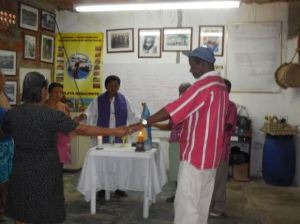
Like Christ, LIVE , now and forever!
Rev.Dr.Judy Lee,RCWP
Co-Pastor Good Shepherd Inclusive Catholic Community of Fort Myers, Florida
We have passed the thirteenth-year anniversary of the attack on the World Trade Center in September. Among the thousands of victims of that attack was Father Mychal F. Judge, the fire department chaplain who, while ministering to the fire fighters working at Ground Zero, was killed by falling debris from the Towers. In Father Mychal’s pocket was this prayer that he always carried with him:







 A
A
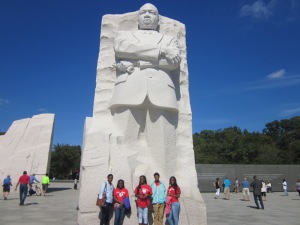








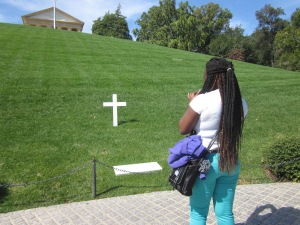
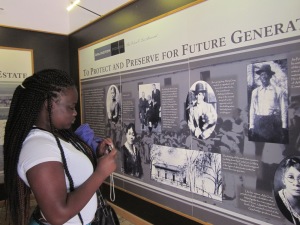
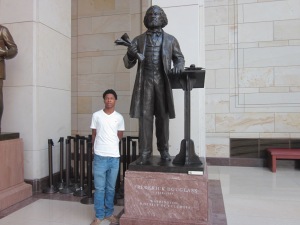

















Recent Comments